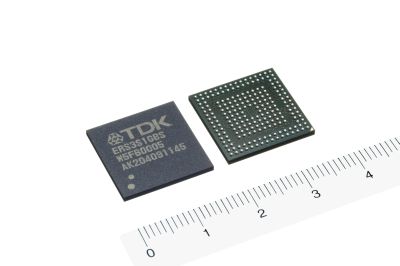TDK Launches Single-Chip SSD
TDK has developed a single-chip SSD that is significantly smaller than previous similar products.
The eSSD series will be available in a 17 mm by 17 mm package that integrates a NAND Flash memory controller with a 3 Gbps SATA interface and 1 to 4 GB of storage capacity.
TDK said that it expects the chips to make their way especially into consumer electronics as well as automotive and industrial products, but believes that thin client PCs, mobile Internet devices, netbooks and other ultra-mobile PCs will adopt the eSSD as well.
According to the manufacturer, the chips use single-level cell NAND flash and support AES 128-bit encryption. The maximum data read speeds of the chips is MBps and write access speeds reach up to 30 MBps. There was no information on availability and price.
Applications of such a device include:
- Office equipment such as multifunction printers (MFP), label printers, barcode printers, and commercial projectors
- Amusement devices such as karaoke on demand, arcade games, and game consoles
- Factory automation equipment such as NC machine tools, sequencers, PLCs, panel computers, touch panel systems, and embedded CPU boards
Get Tom's Hardware's best news and in-depth reviews, straight to your inbox.
- Railway and transport equipment such as automated ticket gates, automated ticket vending machines, commuter pass vending machines, automated air ticket vending machines, and automated check-in systems
- Banking terminals such as POS devices, convenience store and kiosk terminals, and ATMs
- Medical and measuring instruments such as diagnostic imaging systems, cardiography equipment, blood analysis equipment, medical PCs, and electronic records systems
- Communications and broadcasting equipment and information system devices for base stations such as third-generation mobile phone data communications systems
- Security terminals and security devices such as digital signage, entry control systems, and monitoring cameras
- Disaster prevention related equipment such as earthquake early warning systems and household fire detectors
- Audio-visual devices such as digital cameras, video cameras, smart TVs, Blu-ray TVs, Blu-ray disc players, Blu-ray disc recorders, set-top boxes (STB), and communication satellite broad-cast tuners
- Thin client PCs and mobile Internet devices (MID), netbooks and other ultra-mobile PCs (UMPC)
- Automotive devices such as car navigation systems, portable navigation devices (PND), digital tachographs, data loggers, drive recorders, and rear view monitors

Douglas Perry was a freelance writer for Tom's Hardware covering semiconductors, storage technology, quantum computing, and processor power delivery. He has authored several books and is currently an editor for The Oregonian/OregonLive.
-
dgingeri This would be wonderful for VMWare host machines, for the main Hypervisor. Of course, the gust machines would use other storage, but this would be a great boot drive.Reply -
dgingeri They were saying 30MB/s, or right around the speed of a higher end USB flash drive. Not much, but better than using a USB port, I suppose.Reply -
freggo 1 to 4GB on this little chip.Reply
Before you say 'not enough'... let's go Back to the future for a moment to say, 1986.
We where selling 8MB expansion boards for the Amiga than for $1800 (Yes, OneThousandEighthundred).
So that 4GB Chip holds the memory of 500 of these ancient cards; worth $900.000 :-)
The cards where full length cards weighting about a pound each; so we are talking replacing some 500lb with a chip weighting in at maybe an ounce.
Oh, how times have changed.
-
rosen380 How does that invalidate 'not enough'? In 1986 people didn't store 1000s of songs and movies on their portable devices.Reply
Around 1990 I bought 8MB of RAM for $54 per MB, now I can buy a single 8GB stick for under $50. All it says is that technology gets cheaper and better over time.
1-4GB is actually not enough for smart phones, tablets, desktops, laptops, netbooks etc... -
Marcus52 alvinejust give us lower SSD pricesReply
This kind of technological development will help lead to lower SSD prices.
;) -
techcurious Douglas, you are taking your total disregard for proofreading to a new low..Reply
The maximum data read speeds of the chips is MBps and write access speeds reach up to 30 MBps.
Now that I have done part of your job for you, would you care to fill in the missing numbers? Or shall I go google that myself and post the answer here for you as well? -
techcurious Ok Douglas. Here you go.. apparently the maximum read speed is 55 MBps. I'm sure you won't bother to fact check and will just take my word for it..Reply
If you want to share your paycheck with me, we can make this a regular thing!
